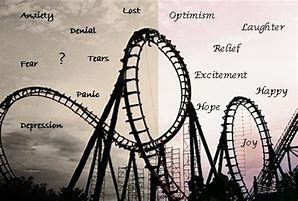
There are several reasons why emotional abuse is difficult to identify, even if you’ve seen it before:
- The strategy is subtle and continuous and woven into every interaction you have with the individual. An abusive event taken on its own, is in fact not abusive. They could just be having a bad day, especially if they usually respond in a healthy manner. It becomes abusive only when you notice a recurrent pattern of some of the behaviors mentioned before. This is where I have a problem with the ‘acceptable’ part of emotional abuse in society. For example, we would pick up on abuse much quicker if everyone accepted that it isn’t OK to snap at people just because you happen to be in a bad mood. Many comedies use these types of interactions as the basis for their humour. This communicates to people that it is OK to treat people like that.
- Abusers make use of both ‘negative’ and ‘positive’ manipulation. Many abusers are skilled at coming across as God’s gift to humanity amongst those they associate with. The victim then struggles to recognize abusive behavior, as they are so convinced that the abuser is wonderful. The abuser also often creates a negative perception of the victim in the same circles, which makes it much harder for the victim to seek help amongst friends and family. The victim is perceived to have issues while they can’t see the abuser of being capable of anything bad.
- These relationships often have a roller coaster effect. The abuser skillfully manipulates lows one day followed by a high the next. The victim gets wrapped up in the high, and so completely forgets about the lows. These highs are also used as ammo against the victim in case they try bring up a negative aspect of the relationship. The abuser just circles the conversation to a high and blames the victim for being forgetful or ungrateful for the good in the relationship. Before the victim knows what is happening they have apologized, while the abuse was never discussed.
- There seems to be a few hallmark emotional abuse characteristics that professionals focus on. If you do not complain of these specific criteria you may not be taken seriously. Unfortunately, emotional abuse covers a broad range of characteristics, and so by focusing on one set of characteristics you’ll miss a whole lot of others. To assist you, this article contains a table with a comprehensive definition of abuse, including emotional, to help you identify problems.
- There is a normal give and take that occurs in any relationship. However, abusive relationships often exist between an extreme taker and an extreme giver. Everyone is happy to give up to a certain point, then they notice they aren’t getting anything in return and will not pursue the relationship further. The excessive giver, on the other hand, won’t notice that they aren’t getting anything in return. Or they may realize it but be accepting of the fact (a tip for you guys, it’s not acceptable to always take without giving in return).
- Finally as I mentioned before people are very ignorant about this form of abuse! And there are so many ways to manipulate that even if you have seen it before, you may not identify other forms of emotional abuse. Most people who actually know what it is, are those who have been in an emotionally abusive relationship themselves. Not even all health professionals may be fully aware of its scope. Don’t be scared to print out the article above with the parts that relate to you, and discuss it with them, so that they can adequately assist you.
Once there is awareness we can do something about it as a society #lovenotcontrol.
Next post: Early warning signs that your relationship is heading to one of abuse
Back to home
